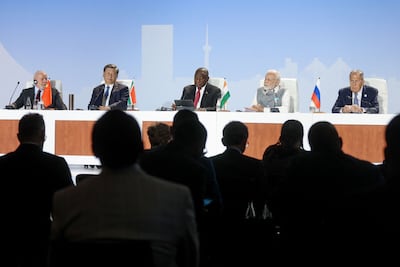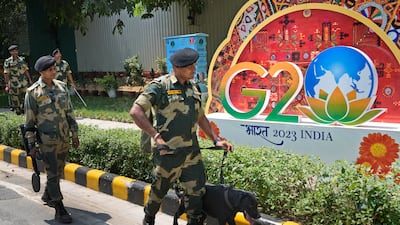The G20 summit in New Delhi this weekend has all the makings of the joyous and extravagant “big fat Indian wedding”, with its attendant dazzle and back-slapping bonhomie. The Indian government has allocated nearly $120 million for hosting the summit and related events, and it is pertinent to review what New Delhi expects as the outcome of this year-long exercise that has been the top priority for Prime Minister Narendra Modi and has his personal imprint.
Some background first. The G20, formed in 2008, brings together a wide spectrum of nations that includes the affluent G7 grouping, plus powerful developing nations and the EU as a collective entity. The primary focus for the G20 is on macro-economic and global policy issues but global geopolitical developments do shape its deliberations. Mr Modi has decided to use this “once-in-20-years” opportunity innovatively; to project India as a major and credible voice on the global stage – one that speaks for the Global South when the divide between the rich nations and the less prosperous is growing.
There is no denying the link with domestic politics. The fact that the G20 summit is being held in the run-up to the Indian general election slated for the first half of 2024 has its own subtext. The billboards that will welcome the delegates provide the linkage. In essence, the image of India with Mr Modi as the persuasive chief sherpa of the G20 will be burnished in a visible manner and the recent Moon landing by India's space research organisation has added to this buoyancy.

However, this G20 summit has to deal with prickly and contentious matters that have emerged over the past year, and this is proving to be a challenge for India as the chair. Despite extensive pre-summit consultations among the officials of the G20, it appears that a comfortable consensus on the final joint statement by the leaders has remained elusive until now. The war in Ukraine and the Russia-China position on how this tangled and reckless invasion is to be interpreted has become a hurdle, and it is unlikely that a modus-vivendi will be arrived at by summit closure.
Further, the expected no-shows by some G20 leaders will dilute the in-person participation index that host nations strive for. The absences will be significant. Russian President Vladimir Putin has already conveyed his regrets and will be represented by his foreign minister. This means the possibility of India forging a rapprochement over the war in Ukraine is unlikely to be an option. The other absence is that of Chinese President Xi Jinping, and no specific reason for it has been advanced by Beijing.
It has been pointed out that this is the first G20 summit that Mr Xi is “skipping” – barring the pandemic years – and this decision has been interpreted by many analysts as a diplomatic snub to Mr Modi. The recently concluded Brics summit in South Africa that brought together leaders of Brazil, Russia, India and China saw Mr Xi playing an active role, and he was also accorded special guest status by the host nation.
Perhaps Beijing is reluctant to give much space or forum for India to be acknowledged as a credible voice on the global stage. Already having considerable influence in Brics, with the recent expansion to 11 members, and the Shanghai Co-operation Organisation (SCO), China may be determined to be the principal player in multilateral fora and be the alternative to the US-led western-dominated global order.
With the US partnering India across various domains and US President Joe Biden being accorded special status at the G20 summit – where Mr Modi will hold a bilateral summit with the US leader – Chinese chagrin is palpable. But staying away from the summit without a valid reason, when the world is grappling with multiple crisis-tinged exigencies (climate change, global warming, food insecurity and nuclear threats) is a peculiar decision for a major power.

Paradoxically, India has also supported the concept of multipolarity and strategic autonomy in global matters, as well as the reform of multilateral institutions – primarily the UN Security Council – whose membership Delhi believes is a legitimate aspiration. In keeping with its non-aligned position, India has steadfastly remained outside of formal military alliances. Yet when faced with an intractable security and strategic challenge from neighbouring China, which erupted with deadly results in June 2020 in Galwan, the Modi government has prudently and quietly forged a closer partnership with Washington.
Thus India has to manage a complex set of contradictions, wherein it has to resist Chinese assertiveness even while remaining invested in groups such as the Brics and SCO, and concurrently maintain its special relationship with Moscow – a balancing act that is discernible in the Indian position over the war in Ukraine. This trapeze act by Delhi may prove to be more difficult in the near future if the current texture of the India-China relationship is any indicator.
Whether or not a consensual joint statement is issued by the G20 leaders on Sunday, India and Mr Modi will have received high-octane visibility for a brief period. Hopefully, the voice of the Global South will be heard in an empathetic manner, and the ultimate objective of an equitable and sustainable socio-economic model for our planet and its inhabitants is not abandoned.















